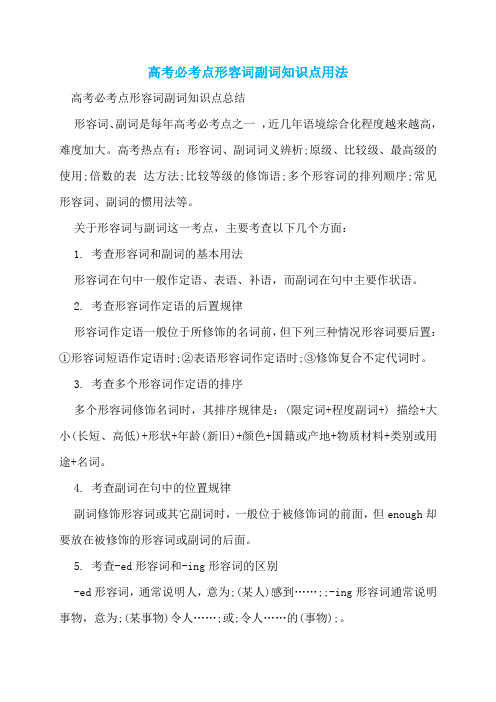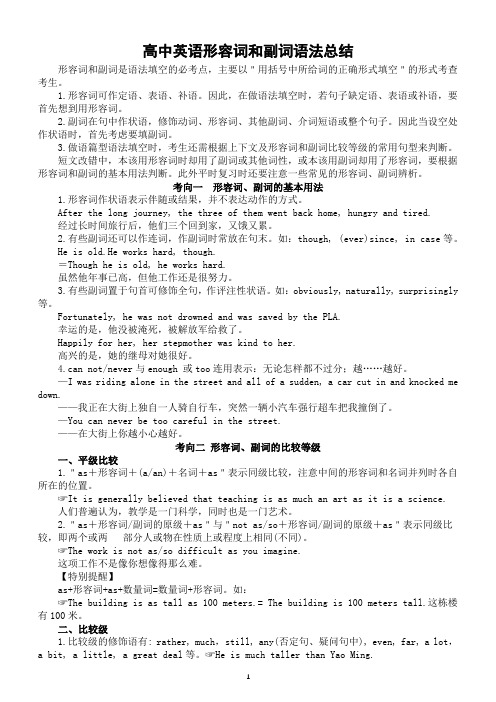高考英语形容词与副词考点归纳
高考英语语法复习形容词与副词 讲义

高考英语形容词与副词一、形容词(1)作定语,常用来修饰名词或代词。
These are valuable suggestions.(这些是宝贵的建议。
)I have something important to tell you.(我有重要的事情要告诉你。
)(2)作表语,放在系动词之后说明主语的情况。
His suggestions are valuable.(他的建议很有价值。
)I felt terrible this morning.(我今天早上感到不舒服。
)(3)作宾语补足语,放在宾语之后对宾语加以修饰说明。
You must keep your eyes closed.(你必须闭上眼睛。
)I find it hard to travel around the big city.(我发现在这个大城市旅行很难。
)(4)作状语,用以说明情况。
Curious, we went into the cave.(出于好奇,我们进了洞里。
)He returned home, safe and sound.(他回到了家,安然无恙。
)形容词作定语时一般置于被修饰词前作前置定语,下列情况中形容词通常后置于被修饰词。
(1)修饰something,anybody,nobody,anything等复合不定代词时There is nothing wrong with the machine.(机器什么问题都没有。
)(2)形容词词组作定语时She bought a book suitable for children.(她买了本适合孩子们的图书。
)(3)修饰表示数量的词要后置The baby is only five months old.(这个婴儿仅有五个月大。
)(4)enough作形容词修饰名词时,一般放在名词之前,也可放在名词之后We don't bring enough money.(我们没带够钱。
)There‘ll be time enough to relax when you’ve finished your work.(你完成工作后会有足够的时间来放松。
第14讲形容词和副词的用法(核心考点)(原卷版)-2024年高考英语一轮复习

第14讲形容词和副词的用法(核心考点精讲精练)1. 三年真题形容词和副词考点细目表时间卷次语法填空/短文改错/单项选择2023年新高考I卷语法填空: ____36_tasty___ (taste);____44 rarely____ (rare)新高考II卷语法填空: ___43_Basically__ (basic)全国甲卷语法填空: ___47 Different___ (difference)短文改错:truth改为true;beautifully改为beautiful全国乙卷语法填空: ___49 remarkable_____ (remark)短文改错:final改为finally北京卷语法填空: ____12_ exactly___(exact)浙江卷(1月)语法填空:____57_originally___ (original);____61_spacious___ (space);____62simply____ (simple)(6月)语法填空:天津卷单项选择:2022年新高考I卷语法填空: ____ eventually______ (eventual)新高考II卷语法填空: ___38 aslpeep___ (sleep);___40accidentally___ (accidental )全国甲卷语法填空: ____meaningful______ (meaning)短文改错:closely改为close全国乙卷语法填空: /短文改错:greatly改为great北京卷语法填空: /浙江卷(1月)语法填空: ____roughly______(rough)(6月)语法填空: /天津卷单项选择:well aware of2021年新高考I卷语法填空: 3undoubtedly(undoubted);5 astonished (astonish)新高考II卷语法填空: ____61harmful____ (harm);___62_excited___(excite)全国甲卷语法填空: 10daily (day)短文改错: /全国乙卷语法填空: 8financial(finance);1educated (educate)短文改错:mentally改为mental北京卷语法填空: ____16safely____(safe)浙江卷(1月)语法填空: 8sharply(sharp)(6月)语法填空: /天津卷(第一次)单项选择: increasingly(第二次)单项选择:Eventually;alternative2. 命题规律及备考策略【命题规律】近3年高考卷对于形容词和副词的考查一直是重点和热点,主要考查:1.在语篇型填空和短文改错中的形容词和副词的句法功能;2.对形容词和副词的词性转换也是近几年高考考查的重点之一。
高考必考点形容词副词知识点用法

高考必考点形容词副词知识点用法
高考必考点形容词副词知识点总结
形容词、副词是每年高考必考点之一,近几年语境综合化程度越来越高,难度加大。
高考热点有:形容词、副词词义辨析;原级、比较级、最高级的使用;倍数的表达方法;比较等级的修饰语;多个形容词的排列顺序;常见形容词、副词的惯用法等。
关于形容词与副词这一考点,主要考查以下几个方面:
1. 考查形容词和副词的基本用法
形容词在句中一般作定语、表语、补语,而副词在句中主要作状语。
2. 考查形容词作定语的后置规律
形容词作定语一般位于所修饰的名词前,但下列三种情况形容词要后置:
①形容词短语作定语时;②表语形容词作定语时;③修饰复合不定代词时。
3. 考查多个形容词作定语的排序
多个形容词修饰名词时,其排序规律是:(限定词+程度副词+) 描绘+大小(长短、高低)+形状+年龄(新旧)+颜色+国籍或产地+物质材料+类别或用途+名词。
4. 考查副词在句中的位置规律
副词修饰形容词或其它副词时,一般位于被修饰词的前面,但enough却要放在被修饰的形容词或副词的后面。
5. 考查-ed形容词和-ing形容词的区别
-ed形容词,通常说明人,意为;(某人)感到……;;-ing形容词通常说明事物,意为;(某事物)令人……;或;令人……的(事物);。
为大家整理的高中英语知识点(形容词和副词)就到这里,同学们一定要认真阅读,希望对大家的学习和生活有所帮助。
形容词与副词高考热点归纳

C teb t r .h et e
D. e e l vr w l y
【 例 2 O etobo sti oei 典 】 fh ok ~ s n t w h s
A.a t n r hine C. het nn r t hi e B.t hi e t he t nn s D.at i ne t h n s
— — 一
n i b r h a o et dsu stepo lm. 2 1  ̄ 湖 北 eg o oh d c m i s h rbe (0 2 h w o c 省 高考 题 )
A.t na ie y e ttv l B.t ug te sy ho hl s l
【 例 1 Atog eddnt nw B s nw l h a e 典 】 l uhh i o o ot e , em d h k o l
hi y swa
— — — — — — —
t t e Ho r l i i g o h meCi eBul n . c d B. i c l d f ut i f D. i c l y df ut i f l
t i o hs
A . te bet r B. s be t
. 2 1 (0 2
【 例 1 .ehp ene osn o D . mi e 年 全 国卷I高考 题 1 典 】P rasw edt edfr r S t t se ‘ ho I
w a a o a o ti ” F t e u g se h twe c n d b u t , ah r s g e td
◎ 编闵 /a83 责 i 16r 易 笔 mn@ 硌  ̄n 1o f c n
考 点 一 : 容 词 与 副 词 区 别 形
形容词和副词的知识点归纳英语

形容词和副词的知识点归纳英语一、形容词。
1. 定义与作用。
- 形容词主要用来修饰名词,表示人或事物的性质、状态和特征等。
例如:a beautiful flower(美丽的花朵),“beautiful”描述了“flower”的特征。
2. 形容词的位置。
- 前置修饰:一般放在所修饰的名词之前。
如:a tall boy(一个高个男孩)。
- 后置修饰:- 当修饰不定代词时,形容词后置。
例如:something interesting(有趣的事情)。
- 在一些固定结构中,如“the +形容词”表示一类人时,形容词后置。
例如:the old(老人),the young(年轻人)。
3. 形容词的比较级和最高级。
- 比较级的构成。
- 一般在形容词词尾加 -er。
例如:tall - taller。
- 以e结尾的形容词,直接加 -r。
如:nice - nicer。
- 重读闭音节,双写尾字母再加 -er。
例如:big - bigger。
- 以“辅音字母 + y”结尾的形容词,把y变为i再加 -er。
如:heavy - heavier。
- 不规则变化:good/well - better,bad/badly - worse,many/much - more 等。
- 最高级的构成。
- 一般在形容词词尾加 -est。
例如:tall - tallest。
- 以e结尾的形容词,直接加 -st。
如:nice - nicest。
- 重读闭音节,双写尾字母再加 -est。
例如:big - biggest。
- 以“辅音字母 + y”结尾的形容词,把y变为i再加 -est。
如:heavy - heaviest。
- 不规则变化:good/well - best,bad/badly - worst,many/much - most 等。
- 比较级和最高级的用法。
- 比较级用于两者之间的比较,常用结构有:A+be+形容词比较级+than + B。
高中英语高考复习形容词和副词语法总结

高中英语形容词和副词语法总结形容词和副词是语法填空的必考点,主要以"用括号中所给词的正确形式填空"的形式考查考生。
1.形容词可作定语、表语、补语。
因此,在做语法填空时,若句子缺定语、表语或补语,要首先想到用形容词。
2.副词在句中作状语,修饰动词、形容词、其他副词、介词短语或整个句子。
因此当设空处作状语时,首先考虑要填副词。
3.做语篇型语法填空时,考生还需根据上下文及形容词和副词比较等级的常用句型来判断。
短文改错中,本该用形容词时却用了副词或其他词性,或本该用副词却用了形容词,要根据形容词和副词的基本用法判断。
此外平时复习时还要注意一些常见的形容词、副词辨析。
考向一形容词、副词的基本用法1.形容词作状语表示伴随或结果,并不表达动作的方式。
After the long journey, the three of them went back home, hungry and tired.经过长时间旅行后,他们三个回到家,又饿又累。
2.有些副词还可以作连词,作副词时常放在句末。
如:though, (ever)since, in case等。
He is old.He works hard, though.=Though he is old, he works hard.虽然他年事已高,但他工作还是很努力。
3.有些副词置于句首可修饰全句,作评注性状语。
如:obviously, naturally, surprisingly 等。
Fortunately, he was not drowned and was saved by the PLA.幸运的是,他没被淹死,被解放军给救了。
Happily for her, her stepmother was kind to her.高兴的是,她的继母对她很好。
4.can not/never与enough 或too连用表示:无论怎样都不过分;越……越好。
—I was riding alone in the street and all of a sudden, a car cut in and knocked me down.——我正在大街上独自一人骑自行车,突然一辆小汽车强行超车把我撞倒了。
高考英语形容词与副词
无比较级,最高级的形容词和副词
1。表示比较,特殊意义的: comparative(ly),relative(ly),special(ly)
2。表绝对意义的unexpected(ly),entire(ly),excellent(ly),perfect(ly),total(ly),thorough(ly),whole(ly),complete(ly)
01
=be…rather than….=be rather…thaFra bibliotek….02
She was more frightened than hurt.
03
=She was less hurt than frightened.
04
=She was frightened rather than hurt.
05
4。形容词和副词的比较等级的用法:
比较等级的常见句型: 1)as+原级+as (as+adj.+a/an+单数名词+as) Tom can’t pay as high a price as I asked. It’s not so/as difficult as I expected.
2)比较级+than+比较对象(less+原级) He is taller than I/me. Mary is less clever than Tom.
5.比较状语中动词的使用: Bob looks younger than I do. Bob looks younger than he is. Bob looked younger than I did. I know you better than he does. I know you better than him.
高考英语形容词和副词三十大核心考点
第六章(Chapter6)形容词和副词(Adjectives and Adverbs)高考考点:1.多个形容词修饰名词时的顺序;2.比较级表达最高级含义的用法;3.能用于修饰比较级的词或短语;4.近义形容词、副词在具体语境中的运用;5.形容词和副词的辨析6.1 形容词及其用法1)作定语、表语和宾语补足语的用法。
2)比较等级原级、比较级、最高级(1) 构成:-er; -est; more; the most(2)基本句型比较级形式+ than …the+ 最高级形式+ in/of …as + 原级形式+ as …not as (so)+ 原级形式+as …6.1.1 形容词在句子中的作用形容词在句子中主要用作:定语、表语、宾语补足语和状语。
【必背典例】1.Shanghai is a big industrial city. (定语)上海是一座大工业城市。
Of the 20 people present, I know only one.(后置定语)2.I felt glad that my sister was well again.(表语)3.We found him asleep on the sofa.(宾语补语--构成复合宾语) 我们发现他在双人沙发上睡着了。
4.They came over, eager to help. (状语)他们跑了过来,亟于帮忙。
Afraid of the hardships, they stopped half-way.(状语) 由于害怕困难,他们中途停了下来。
5.He read all kinds of books, ancient and modern, Chinese and foreign. (间或用作同位语)他看了各式各样的书,古今中外都有。
6.Strange to say/Strangely enough, he did pass the exam after all. (独立成分)说也奇怪,他考试竟然及格了。
高考英语语法知识总结形容词和副词
高考英语语法知识总结形容词和副词高考英语语法知识总结(形容词和副词)如下:形容词、副词是每年高考必考点之一,近几年语境综合化程度越来越高,难度加大。
高考热点有:形容词、副词词义辨析;原级、比较级、最高级的使用;倍数的表达方法;比较等级的修饰语;多个形容词的排列顺序;常见形容词、副词的惯用法等。
关于形容词与副词这一考点,主要考查以下几个方面:1. 考查形容词和副词的基本用法形容词在句中一般作定语、表语、补语,而副词在句中主要作状语。
2. 考查形容词作定语的后置规律形容词作定语一般位于所修饰的名词前,但下列三种情况形容词要后置:①形容词短语作定语时;②表语形容词作定语时;③修饰复合不定代词时。
3. 考查多个形容词作定语的排序多个形容词修饰名词时,其排序规律是:(限定词+程度副词+) 描绘+大小(长短、高低)+形状+年龄(新旧)+颜色+国籍或产地+物质材料+类别或用途+名词。
4. 考查副词在句中的位置规律副词修饰形容词或其它副词时,一般位于被修饰词的前面,但enough却要放在被修饰的形容词或副词的后面。
5. 考查–ed形容词和-ing形容词的区别-ed形容词,通常说明人,意为“(某人)感到……”;-ing形容词通常说明事物,意为“(某事物)令人……”或“令人……的(事物)”。
6. 考查两种不同形式的副词的用法差异即考查与形容词同形的副词与形容词后加ly构成的副词的区别。
7. 考查形容词和副词的比较等级。
8. 考查比较等级的修饰语。
考点1:在具体的语境中辨析形容词与副词的语义从复现的频率来看,此点是高考对形容词、副词考查的第一大热点。
解答此类题关键是要分析具体的语境,结合基本词义、搭配等来选择正确的答案。
经过统计,常见常考的形容词和副词有(按频度排列):even; interested; interesting; yet; hardly; just; therefore; though; too; very; common; effective; either; ever; fair; however; less; more; nearly; only; purposefully; rather; still; such; surprised; surprising 还有以下形容词和副词应当熟悉和掌握: a good many; a number of; acceptable; accidentally; actively; adequately; already; another; anxious; anyway; ashamed; attentively; bad; badly; besides; better; but; careful; changeable; cheap; comfortable; convenient; eagerly; easy; encouraging; enha-ncing; equal; even though; eventually; fairly; far; fewer; following; formally; friendly; gen-erously; gradually; heavily; historic; hopefully; immediately; inaccessible; individual; inevit-able; initial; instead; invisible; largely; never; next; no; normal; nowadays; obviously; ordin-ary; other; otherwise; patient; plenty of; prac-tical; promoting; proper; quickly; readily; reasonable; remote; seldom; seriously; short; so; stimulating; traditional; unavailable; unav-oidable; unfavorable; unfortunately; usual; va-rious; weak; well考点2:考查形容词、副词的比较级、最高级及前面的修饰语【备考清单】1) 比较级、最高级的选用及应用范围比较级、最高级常用于表示两者或多者间的比较。
2024年新高考版英语专题二形容词和副词讲解部分
He is no taller than his brother. 他和他的哥哥一样不高。 比较级常见的错误 1.修饰词出现错误:more不可修饰比较级,但可以用much来加强比较级,意 为“……得多,更……”。 She looks much younger than me.(不可使用more) 她看上去比我年轻得多。 2.比较的对象出现错误 The weather of Beijing is colder than that of Shanghai.(不可去掉that of) 北京的天气比上海的冷。 注意:在使用比较级时,比较的对象应该相同。
2.many more,much more的用法区别 ①many more只能修饰可数名词复数。 many more workers更多工人 ②much more既可修饰不可数名词,也可构成比较级。 much more money更多的钱;much more important重要得多 3.当两个人或事物进行比较时,如果前者劣于后者,就用劣等比较结构:主 语+动词+less+原级形容词+than+比较对象。
易混辨析 farther,farthest表示距离上更远、最远;further,furthest表示程度上更进一 步、最大程度,也可以表示距离上较远、最远。 I will give you further details later. 稍后我将提供给你更详尽的细节。
二、形容词的比较级
1.比较级的用法
高考 英语
新高考专用
第一部分 词类
专题二 形容词和副词
知识清单·形容词和副词专讲
考点一 形容词 修饰名词和部分代词,表示人或事物的性质、状态和特征的词叫形 容词。有形容词修饰或限制的名词或代词内涵更丰富。除修饰名词作 定语外,形容词还常作表语和补语。形容词可分为两大类:①描绘性形容 词,用来描绘大小、新旧、颜色、质量等;②限定性形容词,用来限定所修 饰词的数量、距离、范围、所属等。
- 1、下载文档前请自行甄别文档内容的完整性,平台不提供额外的编辑、内容补充、找答案等附加服务。
- 2、"仅部分预览"的文档,不可在线预览部分如存在完整性等问题,可反馈申请退款(可完整预览的文档不适用该条件!)。
- 3、如文档侵犯您的权益,请联系客服反馈,我们会尽快为您处理(人工客服工作时间:9:00-18:30)。
第 1 页 共 2 页 高考英语形容词与副词考点归纳 一、形容词和副词的基本用法 A.形容词:就是用来修饰名词或不定代词,表示人或事物的性质、状态和特征的词。形容词主要作定语、表语、补语。如: 1. This is a new pen. 这是支新钢笔。(形容词new作名词pen定语) 2. These oranges taste ________. (全国卷) A. good B. well C. to be good D. to be well 【分析】答案选A。系动词taste(尝起来)后要接形容词作表语。 3. John was so sleepy that he could hardly keep his eyes ________. (全国卷) A. open B. to be opened C. to open D. opening 【分析】答案选A。形容词open(开着的)作宾补,表示状态。注意:不要选答案D,因为open是短暂性动词,不能表状态。 B.副词:就是修饰动词、形容词、其它副词或全句,说明时间、地点、程度、方式等概念的词。副词在句中主要作状语。如: It’s raining heavily. 雨下得很大。(副词heavily修饰谓语动词) It’s a rather interesting job. 这是一份相当有趣的工作。(副词rather修饰形容词interesting) She speaks English very well. 她的英语说得很好。(副词very修饰副词well) This is just what he said. 这正是他所说的。(副词just修饰what he said) 注:here, there, in, out, away, abroad等少数副词也可以作表语;here, there, home, abroad, below等表示地点或方位的词及today, tomorrow, yesterday, back, out等表示时间或动词方向词还可以作定语。如: Tom isn’t here. 汤姆不在这里。(here作表语) The people there were very kind to us. 那里的人对我们很友好。(副词there作定语,修饰people) 二、定语形容词与表语形容词 A.表语形容词:有的形容词一般只作表语,如表示健康状况的well, unwell, ill, faint,表示情感反应的glad, sorry, fond, worth, able,以a开头的afraid, alone, asleep, alive, awake, alike, ashamed等。但有的可作后置定语或补语。 B.定语形容词:通常只作定语的形容词,如起强调作用的only(唯一的), single(唯一的), certain(某一), real(真正的), true(真正的), very(正是), live(活的), exact(准确的), present(在场的),由名词等转化而来的wooden(木制的), woolen(羊毛制的), drunken(醉的), medical, daily, weekly, electric, former(前任的), some, any, little, many, 及one-eyed之类的复合形容词等。如: This is a medical school. (不说This school is medical. ) 三、形容词作定语的后置规律 形容词作定语一般位于所修饰的名词前,但是在下列情况下作定语的形容词却要位于所修饰的名词之后: A.形容词短语作定语时要后置。如: ________ to take this adventure course will certainly learn a lot of useful skills. (全国卷) A. Brave enough students B. Enough brave students C. Students brave enough D. Students enough brave 【分析】答案选C。enough修饰形容词时要位于形容词之后,排除B和D。brave enough to…是形容词短语作定语,修饰students,要置于名词students之后。 B.表语形容词作定语要后置。如: All the people ________ at the party were his supporters. (北京卷) A. present B. thankful C. interested D. important 【分析】答案选A。表语形容词present(出席的、在场的)作定语,要放在所修饰的名词后。 C.形容词修饰不定代词something, anything, nothing等时,要位于后面。如: Is there anything important in the paper? 报纸上有什么重要新闻吗? 四、多个形容词作定语的排序 多个形容词修饰名词时,其排序规律是:(限定词+程度副词+) 描绘性形容词+表示大小(长短、高低)、形状、年龄(新旧)的形容词+表颜色的形容词+表国籍或产地的形容词+表物质材料的形容词+表类别或用途的形容词+名词。如: 1. John Smith, a successful businessman, has a ________ car. (辽宁卷) A. large German white B. large white German C. white large German D. German large white 【分析】答案选B。按“大小+颜色+产地”的顺序排列。 2. ________ students are required to take part in the boat race. (浙江卷) A. Ten strong young Chinese B. Ten Chinese strong young C. Chinese ten young strong D. Young strong ten Chinese 【分析】答案选A。数词是限定词,应排在形容词前,排除C和D;又strong是描绘,young是年龄,Chinese是国籍,其先后应为“描绘+年龄+国籍”。 3. The ________ house smells as if it hasn’t been lived in for years. (江苏卷) 第 2 页 共 2 页
A. little white wooden B. little wooden white C. white wooden little D. wooden white little 【分析】答案选A。little是限定词,应放在形容词前面,排除C和D;表示颜色的应放在表示物质材料的形容词的前面,排除B。 注:限定词的排序:前位限定词 (指量限定词all, both, half等;倍数词double, twice等;分数词one-third, two-fifths等) +中位限定词 (冠词;指示代词;形容词性物主代词;名词所有格)+后位限定词 (序数词及last, next等;基数词及few, several等)。如: 1. The husband gave his wife ________ every month in order to please her. (重庆卷) A. all half his income B. his half all income C. half his all income D. all his half income 【分析】答案选A。all和half都是前位限定词,his是中位限定词,所以his要位于all和half之后,只有A正确。 2. —How was your recent visit to Qingdao? —It was great. We visited some friends, and spent the ________ days at the seaside. (全国卷) A. few last sunny B. last few sunny C. last sunny few D. few sunny last 【分析】答案选B。last, few是限定词,sunny是描绘性形容词,根据“限定词+形容词”的原则,排除C和D。又根据“序数词(包括last, past, next, another等)+基数词(包括few, several等)”的原则,排除A。 五、副词在句中的位置规律 1) 副词修饰形容词或其它副词时,一般位于被修饰词的前面,但enough却要放在被修饰的形容词或副词的后面。如: 1. —Mum, I think I’m ________ to get back to school. —Not really, my dear. You’d better stay at home for another day or two. (全国卷) A. so well B. so good C. well enough D. good enough 【分析】答案选C。指“身体好”用形容词well (=healthy)而不用good;副词enough修饰形容词时,要位于形容词之后。 2. If I had ________, I’d visit Europe, stopping at the small interesting places. (全国卷) A. a long enough holiday B. an enough long holiday C. a holiday enough long D. a long holiday enough 【分析】答案选A。enough要放在形容词long之后。 3. ________, some famous scientists have the qualities of being both careful and careless. (上海卷) A. Strangely enough B. Enough strangely C. Strange enough D. Enough strange 【分析】答案选A。修饰整个句子,要用副词,排除C和D;副词enough应放在它所修饰的副词strangely的后面,所以选A。 2) 频度副词always, usually, often, never等一般放在行为动词前,或者情态动词、助动词或be动词之后。如: She always gets up early. 她总是起得早。(副词always放在行为动词gets之前) She is seldom late for school. 他很少上学迟到。(副词seldom放在be动词之后) 3) 词表示地点的副词常放在句末;表示确定时间的副词放在句首或句末;表示方式的副词词通常放在“动词(+宾语)”之后,也可放在其它位置;同时有表示时间、地点和方式的副词时,其顺序一般为:方式+地点+时间。如: ________ I went to the railway station to see my friend off. (全国卷) A. After eating quickly my dinner B. After my quickly eating dinner C. After eating my dinner quickly D. After eating my quickly dinner 【分析】答案选C。方式副词一般位于“动词(+宾语)”之后。 六、–ed形容词和-ing形容词的区别 -ed形容词,通常说明人,意为“(某人)感到…”;-ing形容词通常说明事物,意为“(某事物)令人…”或“令人…的(事物)”。这样成对的形容词有:interested / interesting; excited / exciting; frightened / frightening; surprised / surprising; pleased / pleasing; moved / moving; disappointed / disappointing等。 1. Laws that punish parents for their little children’s actions against the laws get parents ________. (重庆卷) A. worried B. to worried C. worrying D. worry 【分析】答案选A。表示人“感到忧虑的”用-ed形容词。句意是:…法律使得做父母的感到忧虑。 2. It is believed that if a book is ________, it will surely ________ the reader. A. interested; interest B. interesting; be interested C. interested; be interesting D. interesting; interest 【分析】答案选D。指书令人有趣用interesting而不interested,排除A和C。interest是动词,“使…有趣”。 注:即使-ed形容词用以说明事物,那也是指与该事物相关的人;即使-ing形容词用以说明人,也是指此人具有该性质或特征。如: He told me the news in an excited voice. 他告诉了那个消息,声音很激动。 The man is interesting. 这个有很有趣。 另外,glad, happy, sorry, angry, thankful, proud等的主语也只能是人;而pleasant, easy, difficult, important等则通常以事物或it作主语,因为它们是说明事物的。如: —I’m very ________ with my own cooking. It looks nice and smells delicious. —Mn, it does have a ________ smell. (北京卷) A. pleasant; pleased B. pleased; pleased C. pleasant; pleasant D. pleased; pleasant 【分析】答案选D。pleased指“(人)感到高兴”,pleasant指“令人愉快的(事物)”。
